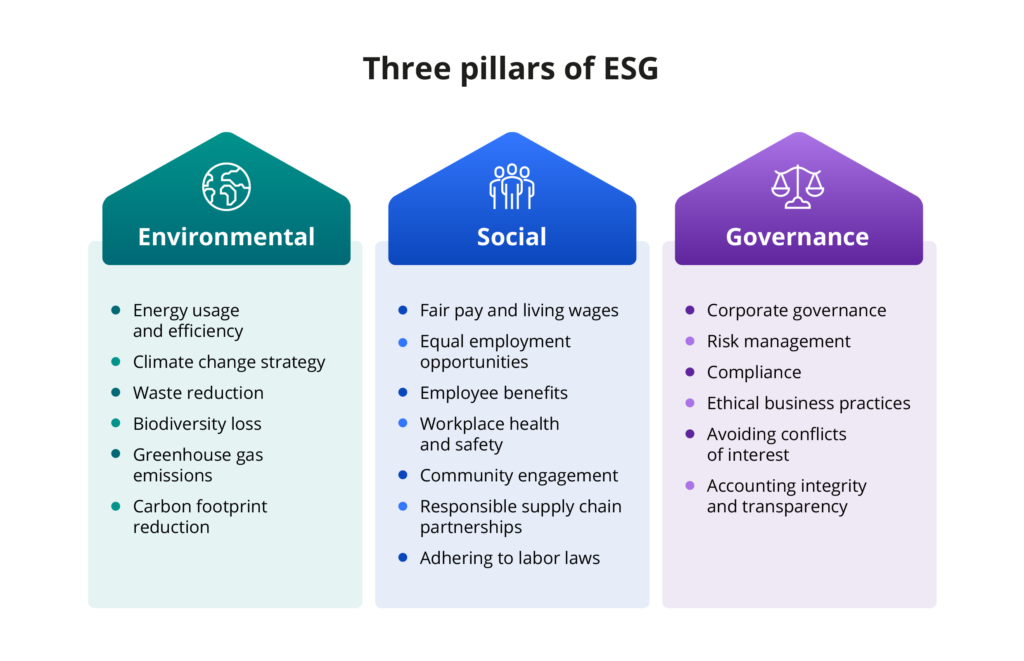The world of finance is seeing a significant shift to a more sustainable and greener approach. While the focus on profitability, innovation, or technology has not taken a backseat, the importance of sustainability is a huge consideration when making financial decisions.
Almost every industry and sector, from manufacturing, urban infrastructure, and energy to corporate finance, is embracing the Environmental, Social, and Governance (ESG) criterion. The finance industry is also incorporating this philosophy, prioritising responsible and forward-thinking decision-making.
ESG offers a framework for analysing and managing climate change, social inequality, and corporate misconduct. This makes it a powerful tool for building resilient, future-oriented businesses.
This blog will explore this concept in depth, focusing on the transformative power of ESG and how it can drive a more responsible approach to capital allocation.
The Impact of ESG on Financial Services
In order to help generate greener, more efficient, sustainable, and beneficial outcomes for the world, the corporate sector of the future is reforming its basic operations based on the characteristics of ESG. Even investment banking, which was once focused primarily on profits and short-term returns, is increasingly driven by long-term sustainable investment.

ESG criteria allow investors to evaluate potential investments beyond the traditional financial metrics using three key aspects:
- Environmental: It tells how well the business manages its environmental impact or contributes to greener or more environmentally friendly initiatives.
- Social: It examines how well a business or organisation manages its relationships with its workforce, customers, suppliers, and the overall community.
- Governance: This aspect analyses the businesses’ approach to internal controls, governance aspects, shareholder rights, audits, executive pay, leadership roles, and more.
As per KPMG’s ESG 2030 Predictions, 65% of global decision-makers in finance and other areas are considering ESG parameters when making investments and merger and acquisition (M&A) decisions.
Thus, companies with strong ESG profiles are becoming more attractive to investors, as they are perceived to carry lower risks and offer higher growth potential. When it comes to fundraising or venture capital, companies, too, are realising that robust ESG practices can enhance their financial performance, attract top talent, and build stronger relationships with stakeholders.
Growth Factors Driving ESG Investing
Several factors have led to a shift towards ESG investing, primarily driven by increasing awareness in private equity and banking about the inherent opportunities in this area. The key factors in this shift include the following:
- Regulatory Pressure: Governments and climate organisations globally are introducing stricter environmental and social regulations, compelling companies to prioritise sustainability in their overall processes. This regulatory push is one of the major reasons why investors are now looking into ESG practices when making decisions on future investments.
- Investor Demand: A growing number of investors, including institutional and retail, are recognising the financial benefits of ESG investing. 84% of global executives think ESG helps deliver a more robust corporate strategy, while 85% of investors believed ESG factors lead to better returns, a resilient portfolio and enhanced fundamental analysis.
- Shift in Consumer Spending: More environmentally conscious and aware customers are increasing the demand for greener, more ESG-compliant products. As per a PwC report, 46% of consumers mentioned buying more sustainable products to help reduce their impact on the environment, and 80% are willing to pay more for sustainable or ethically sourced products.
- Technological Advancements: Advances in data analytics and reporting tools are enabling investors to assess the ESG performance of companies better, making it easier for them to track the long-term impacts of these factors.
- Climate Change Awareness: The increasing awareness of climate change and its impact on economies and societies is driving investors to focus on climate-related risks and opportunities.
- Social and Governance Issues: Growing concerns about social inequality, human rights, and corporate governance are prompting investors to consider these factors in their investment decisions. 57% of consumers have pledged to do business with companies that practice fair trade commitments, including no child labour, fair wages, tackling poverty, and protecting against deforestation or any environmental harm.
The Future of ESG Investing
The influence of ESG investment already indicates that its trajectory will only continue to increase. Integrating ESG considerations into investment-related decision-making will become the norm—not the exception—as awareness and regulatory scrutiny grow. Technology will greatly aid this evolution, allowing for more advanced data analysis, risk assessment, and impact measurement.
But there are still difficulties. Accuracy, comparability, and consistency of data across numerous companies and industries are necessary for effective ESG investing. Strict criteria for disclosure and independent verification are also necessary to reduce the risk of “greenwashing,” which is the practice of companies making exaggerated or misleading claims about their sustainability projects.
The long-term prospects for ESG investing are bright, notwithstanding these obstacles. Businesses with strong environmental, social, and governance (ESG) profiles will benefit from increasing values, easier access to financing, and improved reputations as the global economy shifts toward sustainability.
Conclusion
The bottom line is that the world is changing at a significant rate. Every business needs to understand its impact on this change, be it positive or negative. ESG is all about building a better future, and ESG investing is at the heart of this transformation, recognising that financial success and societal progress are deeply interconnected.
By integrating ESG factors into their investment strategies, financial institutions and the banking sector can mitigate risks, unlock new opportunities, and generate long-term value.
References
- https://www.investopedia.com/terms/e/environmental-social-and-governance-esg-criteria.asp
- https://www.emlv.fr/en/the-rise-of-esg-investing-what-it-means-for-corporate-finance/
- https://www.acuitykp.com/blog/the-rise-of-esg-investing/#:~:text=The%20rise%20of%20ESG%20investing%20is%20reshaping%20the%20financial%20landscape,in%20hand%20with%20ESG%20responsibility.